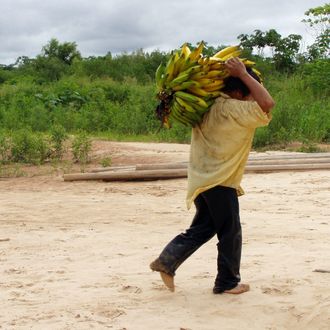
A consistently fun and interesting genre of medical-mystery story is the Whoa, this group story. As in: Whoa, this group lives forever. Or Whoa, this group has a diet that seems super unhealthy and yet they are fitter than us Americans. Yesterday, NPR had a particularly interesting iteration: a Whoa, this group has superhuman hearts story about some farmers in Bolivia.
Reporting for NPR, Michaeleen Doucleff describes an intriguing discovery made by Gregory Thomas, director of the MemorialCare Heart & Vascular Institute at Long Beach Memorial, and some of his colleagues:
[N]o matter how much you exercise, how much kale you eat and how many cigarettes you avoid, heart disease is inevitable. Eventually everyone’s arteries will harden up with some calcium plaque as they age, Thomas thought, increasing the risk of heart attacks and strokes. Now a group of farmers in Bolivia have blown that theory out of the water, Thomas says. The Tsimane are a native population in the Amazon who make a living by hunting, fishing, foraging and farming. The group has preserved their culture and language for thousands of years. And their way of life is incredibly good at protecting the heart, Thomas and his colleagues reported Friday in The Lancet.
According to Thomas’s team’s data, “the heart of an 80-year-old Tsimane has the ‘vascular age’ of an American in his or her mid-50s. And the Tsimane have officially dethroned Japanese women as the group of people with the healthiest hearts in the world, the study reports. The Tsimane now have the lowest levels of coronary artery disease ever recorded.”
What can account for these super-hearts? Interestingly, no one aspect of their diet or lifestyle jumped out and dominated the researchers’ theorizing. A quarter of the Tsimane qualified as overweight by BMI standards, though none was obese. On average, they walk 7.5 miles a day as part of their farming and hunting and gathering, and they are active for about 90 percent of total daylight hours, both numbers which — it will surprise no one — blow sedentary American habits out of the water. Dietwise, the Tsiname ate a lot of carbohydrates, but those carbohydrates came in the form of fiber-rich foods like “corn, cassava and plantains.” They also eat zero trans fats and no so-called “simple sugars,” both of which are consumed in heaping quantities by Americans.
The key insight here, argue the researchers, is probably that there are a lot of ways one can improve one’s heart health. Unless and until they find some magical ingredient that can explain the Tsiname’s superb cardiovascular health, the moral of this Whoa, this group story is surprisingly straightforward and familiar: You should try to move around a lot, and don’t eat so much junk.




